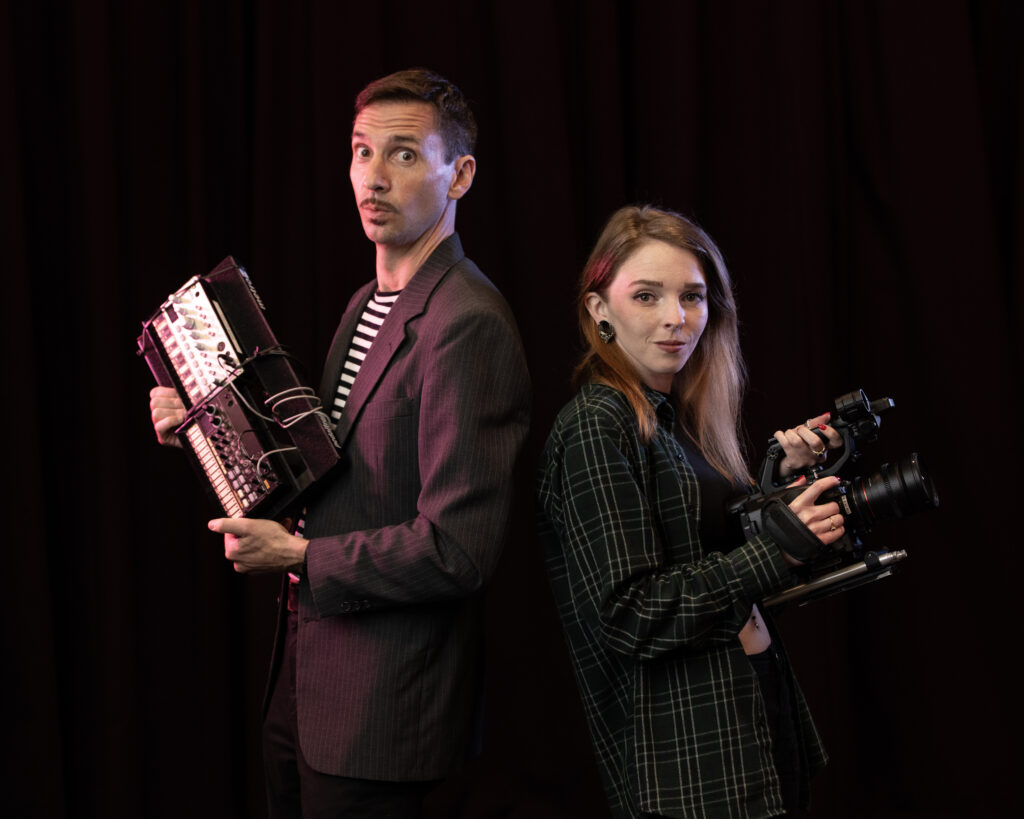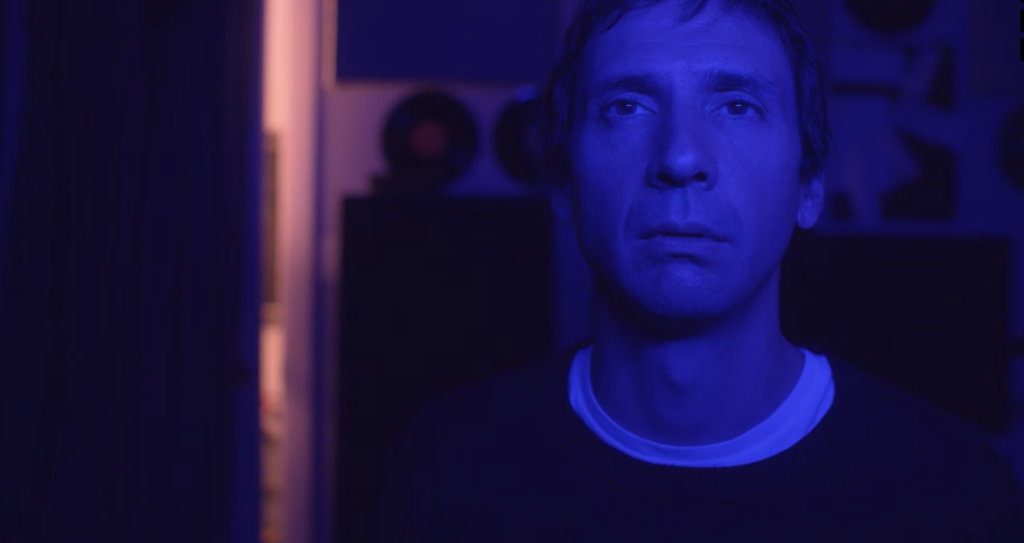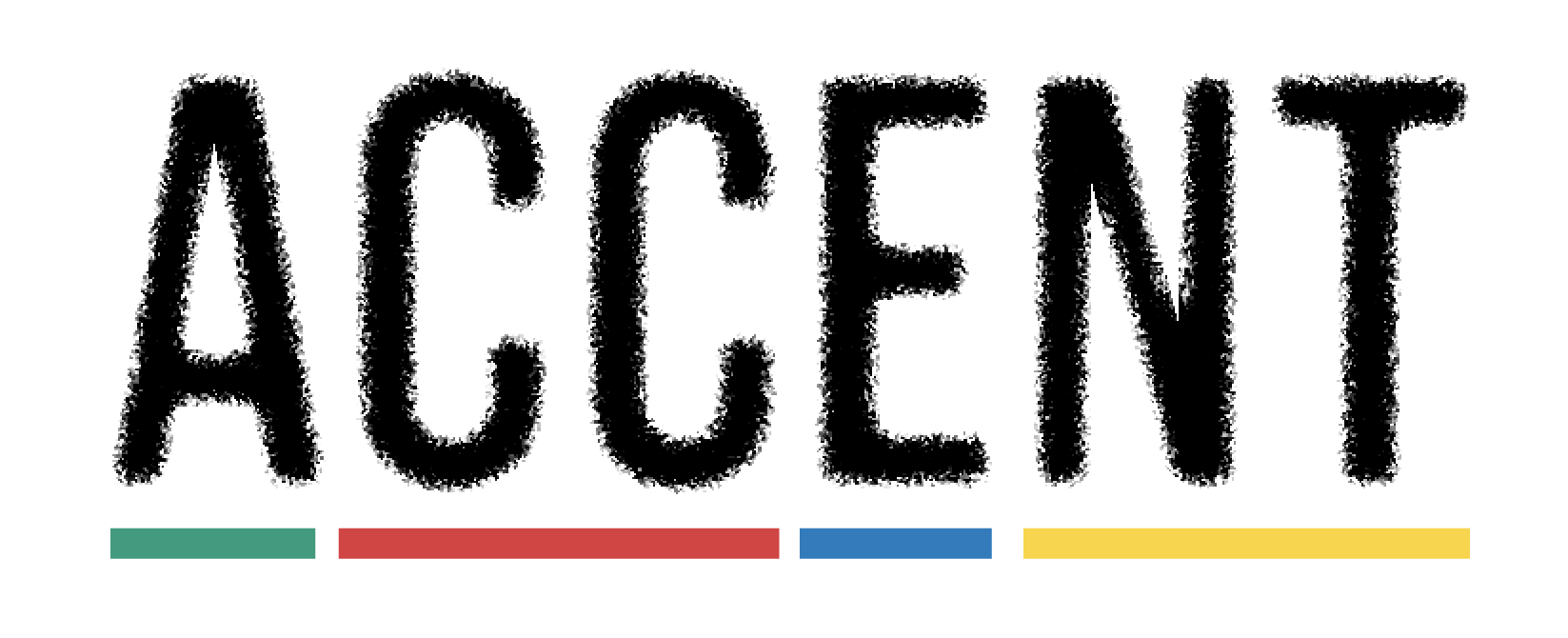Christian Glakas (left) and Schelby Deady (right) holding their respective equipment. Portrait photos taken by Collin Eason.
Written by Marisela Perez Maita
“Everything it’s fine, I am just so tired” are the first lines of Underground, a song written by ACC Digital Composition student Christian Glakas. In the featured music video, a man sits in the darkness of his music studio when a female figure appears from the door. He acknowledges her with a crestfallen and exhausted gaze, but decides to go back to his work without a word. The darkness of the room appears to drag him down as the song continues with the lyrics, “Walk on eggshells, walk on by…”
Isolating from the people we love is a familiar response to many. Artists, especially, often find themselves hiding in their work to ignore the reality that surrounds them – but art can be a platform for healing too. This duality of art’s importance is the emotional narrative that Radio Television Film (RTF) student Schelby Deady wanted to address in the music video for “Underground” which she directed in 2022.
On Feb. 28 of 2024, their music video was presented at the “Arts and Digital Media Student Networking Mixer” as a leading example of the possibilities found in ACC’s recently-created Creative Co-Labs Connect program — an online platform offered by the RTF department and Arts and Digital Media where students can connect to each other’s artistic projects. The tool uses a “finding each other” approach for a collaborative trade of talent, purpose and passion between users. In the case of Deady and Glakas, their music video stands among the many examples of the program’s success not only due to the art they created, but for the story that both of the artists brought to the table.
In 2022, Deady was double majoring in RTF and Emerging Media at ACC when she was assigned to make five short films at a length of no more than five minutes for her Film-Style Production class. The challenge sparked her idea of an opportunity to try something different.
“I went to my professor and I told him that I wanted to do a music video,” Deady says across the video call, her sharp green eyes accentuated by her black-toned makeup. “It was kind of uncharted territory and not a lot of people do that.” To the aspiring film director, exploring new artistic disciplines is important and music videos, especially, represent an important part of her time as a teenager.
“I grew up watching MTV and having music videos literally all night long and all day long,” she says. “In my free time if I’m like painting or doing art I’d have music playing on my computer and I’d be watching music videos.”
Her first attempt at a similar project was for one of her favorite songs, “Dead People Are Crawling in My Head” by Sleepy Dog. Attempting to explore a long-time idea she had at that time, Deady didn’t have a Creative Co-lab to find extra talent and had to network in her classes until she found an actor for the project. Sleepy Dog agreed to her request to make the video but never gave her official credits, so she looks at it only as her first attempt at a music video and not as an “official” success. She would not try again until 2022, when she proposed the idea to her professor for the short-film assignment.
“I like how music videos can be so nonlinear. Things don’t have to make sense, but the visuals complement the music or enhance the music,” Deady says, her creative persona enchanted by the dreamlike art decorating her room walls. “There is so much more you can do with a music video, and they’re shorter, so it’s like making a short film.”
The versatile RTF student was looking for musicians with completely recorded songs under around three minutes. After she sent a flyer to the music department chair and posted it on Creative Co-Labs, she received around 10 to 15 submissions.
“[We] had cool ideas in our head of what we wanted to do with it, but my big thing was I wanted the musician to also play a role in creating the visual aspect of it.”

Deady and her partner went through all of the submissions until they landed on Christian Glakas and his song as the ideal subjects for the goal of their project. Glakas, whose artistic name is Merciful Heavens, enrolled at ACC in 2022 to expand his knowledge in digital composition after playing in bands for most of his life. He had been spending the last six months finishing on recording a couple of songs when he came across Deady’s flyer.
“For me it was awesome timing,” Glakas says with a cheerful and mellow voice. “The songs were almost experiments. Learning vehicles to try all these different tools that I had in my computer at home but that I didn’t really know how to use,” the singer-songwriter says.
Merciful Heavens’ music balances folksy alternative pop and indie rock. His lyrics invite the listener to take the time to appreciate all sensations, sounds and nuances of the present, as if exploring the world by walking. The introspection is carried by the energetic sounds of the guitars and drums, characteristic of the indie genre that thrives on experimentation and warm rhythms.

The making of his song “Underground” was one of the pandemic project experiments he finished in 2022. The piece was born from a trajectory moment in his life when a gradual vocal inefficiency affected his speaking capacity completely. His voice started to wear down and became raspy and higher pitched. Different doctors gave him different diagnoses, but they all agreed his vocal cords worked inefficiently with each other.
“One doctor made an analogy and said that if my vocal cords were like two hands trying to come together at the same time to catch a ball, one would arrive at the ball early, the other would arrive late, and they would drop the ball,” Glakas says.
He described the feeling of being an observer in life and not a participant. He had to monitor his speech as if he had a certain number of “talking tickets” each day: If he talked too loud, he described how it would cost all of his talking-time in 10 seconds.
“Most people don’t think too closely about their breathing when they’re talking. They just talk,” but Glakas says that singing is easier. “With singing, you get to take a big breath and you already know what you’re going to say. And one of the things that you can describe as what makes a good singer is someone who delivers a line in a way where the consonants don’t interrupt the vowel sounds as much.”
Glakas decided that he would use his limited talking time to sing. Singing only in small increments, he explained that whether it was “bad” or “good” didn’t matter because the fact that he could sing a few lines was already enough for him. Glakas endured both the pandemic and personal isolation, transforming the detachment fears into a playful, musical self-discovery.
“Singing that way was actually a good relief because from my whole life leading up to that I was really hard on myself to sing,” he says. “I would sing something 40 times until I got it right. But now I feel lucky to be able to get three lines out.”
When Deady and Glakas met to discuss the collaboration for the first time, Deady realized that her collaborator’s journey and family were important roles for the song and his story. Deady says she remembers how the musician “kept expressing how much his family supported him during that time, but also how it created some sort of distance between them at the same time.”
That is the duality she sought to depict in the video for “Underground”: hiding from the people who are most important to you in whatever ways you can and failing to express your truth, because as in the case of Glakas’ experience, finding the words can involve dealing with both emotional and physical pain. After he told Deady how much time he spent during the pandemic in his music room, she wanted to bring that safe place to life and incorporate it as part of the narrative in the video.
Glakas’ family appears in the video as well, doing what they do in real life as described to Deady: his two kids playing under his desk and his wife checking on him every once in a while. The student director hoped to capture a time capsule of Glakas’ life, a memento of that whole period he endured. Unlike the first time she made a music video, this time Deady had more experience and a bigger crew.

“I think my mark is the concept of dreaming. Whether it be nightmares or aspirations or just absolute confusion. I want to personify what’s going on in our heads and make it a visually moving piece of art,” she says.
In “Underground” she shows the struggle of a man, both husband and father, finding himself and the warmth of those he loves in the music he plays. Their collaboration is a testament to the talent of these two ACC students and the possibilities available by connecting with others in mutual artistic endeavors – a task now made easier through the Creative Co-Lab program that Deady oversees herself as part of her job at ACC.
The young film director now holds her two certificates in RTF and works in ACC as a Teacher’s Assistant. For the Creative Co-Labs Connect program, she keeps track of the current and past projects that students submit.
“We have received 220 submissions in total, and 50 this spring semester,” Deady says, “I like the work and I like seeing what ACC students are up to. Sometimes I get to read the scripts or if I see something and I know of someone who could do it, I can like bring it to their attention or reach out to that person and like be like, ‘hey, I know someone who might work for what you’re looking for,’” Deady says with a smile. On a creative level, she is coming up with new scripts and thinking of possibly turning a music video idea she has into a narrative piece.
On the other hand, Glakas, working on his Digital Composition degree, has performed his songs for the Flex Factory Concert Series at ACC’s Highland Campus and Kick Butt Coffee. Now, he is focusing on bringing to life a new challenging idea: to incorporate theater into his musical performance. He is searching for dancers and actors at ACC who would like to join his new, collaborative endeavor.
“There’s so many of these kinds of projects,” Glakas reflected. “I think there’s so many people who are so good at so many different things. And you grow so much and it helps you to connect with so many things about yourself, and grow more than you would ever do it alone.”
You can find the “Underground” music video here.

